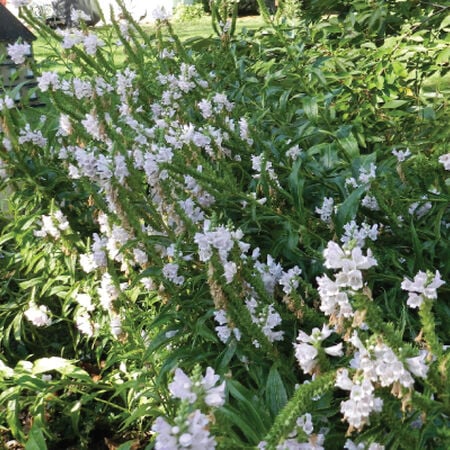Obedient Plant, Physostegia Seeds
Key Attributes
Key Attributes
Product Details
Weight
0.01Depth
0.12Height
4.5Width
3.25Plant Height
3-4'Botanical Name
Physostegia virginianaSeed Type
SeedAdditional Characteristics
Attracts Pollinators, Attracts Birds, Deer Resistant, Extended BloomsSeeds Per Gram
388Seeds Per Pound
176,000Packet
100 SeedsSow Depth
1/8"Seeds Per Ounce
11,000Breed
Open-pollinatedSun
Full SunUses
Cut FlowersLife Cycle
PerennialSow Method
TransplantCategories
FlowersDays To Maturity (# Days)
365Components
Growing Instructions
![]() Learning Download: How to Grow Physostegia
Learning Download: How to Grow Physostegia
Physostegia, also known as lion’s heart, Obedient Plant or false dragonhead, is a flower that is easy to grow and quick to spread. Physostegia is a beneficial plant because it attracts butterflies and hummingbirds, which can be beneficial to the garden.
Before Planting: Start the Physostegia from seed eight weeks before transplanting it into the garden.
Planting: Plant the seeds in the fall, or in the spring after damp stratification for three months at 40 degrees.
Watering: Physostegia is considered to be drought tolerant, but they do best in moist soil.
Fertilizer: Gardeners should not fertilize Physostegia unless it shows signs of nutrient deficiency, such as foliage discoloration or stunted growth.
Days to Maturity: Physostegia’s flowers will bloom from late June through September.
Harvesting: The flowers will bloom from bottom to top and are long-lasting, making them a great bouquet addition.
Tips: Physostegia pairs well with coneflowers, asters and sedum.
Shipping Schedule
Our Seed Promise
 "Agriculture and seeds" provide the basis upon which our lives depend. We must protect this foundation as a safe and genetically stable source for future generations. For the benefit of all farmers, gardeners and consumers who want an alternative, we pledge that we do not knowingly buy or sell genetically engineered seeds or plants.
"Agriculture and seeds" provide the basis upon which our lives depend. We must protect this foundation as a safe and genetically stable source for future generations. For the benefit of all farmers, gardeners and consumers who want an alternative, we pledge that we do not knowingly buy or sell genetically engineered seeds or plants.
The mechanical transfer of genetic material outside of natural reproductive methods and between genera, families or kingdoms, poses great biological risks as well as economic, political, and cultural threats. We feel that genetically engineered varieties have been insufficiently tested prior to public release. More research and testing is necessary to further assess the potential risks of genetically engineered seeds. Further, we wish to support agricultural progress that leads to healthier soils, to genetically diverse agricultural ecosystems, and ultimately to healthy people and communities.
To learn more about the "Safe Seed Pledge" please visit www.councilforresponsiblegenetics.org.

